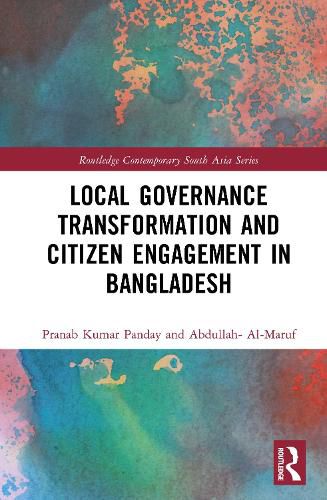Readings Newsletter
Become a Readings Member to make your shopping experience even easier.
Sign in or sign up for free!
You’re not far away from qualifying for FREE standard shipping within Australia
You’ve qualified for FREE standard shipping within Australia
The cart is loading…






Local Governance Transformation and Citizen Engagement in Bangladesh offers a thorough investigation of grassroots democratic practices and citizen engagement in local governance in the country and situates Bangladesh's experience within the larger framework of developing countries. With an eye towards their effects on governance, transparency, and accountability, the book analyses the dynamics of citizen engagement in public forums such as Ward Shava (WS) and Open Budget Meetings (OBM). Employing comparative studies of local government systems in India, Nepal, Sri Lanka, and Vietnam, the authors underscore the challenges and achievements of participatory governance in diverse sociopolitical settings. Combining empirical data with theoretical analysis, the book provides a valuable tool for comprehending the interaction of political culture, legal frameworks, and citizen engagement in forming sustainable local government in Bangladesh and beyond. This study provides doable suggestions for improving participative local governance by addressing structural challenges, power disparities, gender inequality, and the function of NGO. The book demonstrates how inclusive government promotes accountability and helps underprivileged groups to become more powerful, thereby promoting more fair results of progress. This book will be of interest to researchers studying political science, public administration, public policy, development studies and Asian studies in general and governance, decentralisation, and citizen engagement in particular.
$9.00 standard shipping within Australia
FREE standard shipping within Australia for orders over $100.00
Express & International shipping calculated at checkout
Local Governance Transformation and Citizen Engagement in Bangladesh offers a thorough investigation of grassroots democratic practices and citizen engagement in local governance in the country and situates Bangladesh's experience within the larger framework of developing countries. With an eye towards their effects on governance, transparency, and accountability, the book analyses the dynamics of citizen engagement in public forums such as Ward Shava (WS) and Open Budget Meetings (OBM). Employing comparative studies of local government systems in India, Nepal, Sri Lanka, and Vietnam, the authors underscore the challenges and achievements of participatory governance in diverse sociopolitical settings. Combining empirical data with theoretical analysis, the book provides a valuable tool for comprehending the interaction of political culture, legal frameworks, and citizen engagement in forming sustainable local government in Bangladesh and beyond. This study provides doable suggestions for improving participative local governance by addressing structural challenges, power disparities, gender inequality, and the function of NGO. The book demonstrates how inclusive government promotes accountability and helps underprivileged groups to become more powerful, thereby promoting more fair results of progress. This book will be of interest to researchers studying political science, public administration, public policy, development studies and Asian studies in general and governance, decentralisation, and citizen engagement in particular.